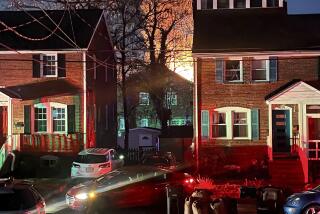Police Search for Clues in Blast That Killed Comrades
BAGHDAD — Iraqi police helped dig through the rubble of an apparently booby-trapped home here Wednesday, seeking clues about whether a massive blast that claimed 30 lives the night before was the work of insurgents who had lured officers into a trap.
The house in the western Baghdad neighborhood of Ghazaliya exploded as police, responding to a tip about suspicious activity, attempted to enter. Seven officers were among the dead, and 21 people were wounded, Interior Ministry spokesman Col. Adnan Abdel-Rahman said.
The blast flattened at least five houses in the mostly Shiite Muslim neighborhood, which is marked by densely packed houses and unpaved roads turned muddy by the winter rain. Neighbors recalled that suspicious-looking men, including one who was believed to be from Sudan, had rented a house in the neighborhood just two days before.
“These bad people are coming from outside the country -- the Sudanese, Syrians and Iranians,” said a local woman who, in keeping with Middle Eastern tradition, identified herself only as Umm Ali, or Ali’s mother. “The government should take all the non-Iraqis out of the country. They are killing the innocent people.”
An officer on the scene, who identified himself as Abu Hiba, or Hiba’s father, said four cars were dispatched after police received a tip about suspicious activity at the house about 11:30 p.m. Tuesday. After coming under fire from inside the house, police tried to force their way into the home, and it exploded.
The Ghazaliya police station was nearly empty Wednesday afternoon, and none of the officers present would give their names. One said police had gone to the house after a neighbor came to the station to report the suspicious newcomers.
Abdel-Rahman, the Interior Ministry spokesman, gave a different version of events. Police had received an anonymous tip, he said, speculating that the residents of the home had deliberately provoked the raid.
“The terrorists in the house started shooting at unarmed civilians. That was when police received the call,” he said. “As soon as they [entered], the blast occurred. That is why we are sure that they were lured in.”
Coaxing police into a rigged structure would be a new tactic for the country’s insurgents, who oppose the U.S. military presence in Iraq and regard the country’s interim government and security forces as collaborators with a foreign occupier.
The rebels have demonstrated an ability to adapt to ever-tightening security, sometimes striking in the heart of the country’s most heavily protected areas.
Bombers have managed to penetrate the Green Zone, the fortress-like swath of central Baghdad that houses the U.S. and British embassies and interim government offices. Last week, a suicide bomber infiltrated the mess hall at a U.S. military base near the northern city of Mosul, killing 22 people, including 18 Americans.
Mosul insurgents, who routed police and national guardsmen in November and now battle Americans for control of the city, struck again Wednesday afternoon with a coordinated attack on a U.S. outpost that involved two car bombs and a direct armed assault. One Task Force Olympia soldier was killed.
Witnesses said an explosives-rigged fuel truck blew up about 4 p.m. outside a house that U.S. troops in recent weeks had used as a field outpost. Capt. Phil Ludvigson, a U.S. military spokesman in Mosul, said soldiers responding to the first explosion were attacked by a second car bomber. The soldiers then came under attack by as many as 50 insurgents with automatic weapons, rocket-propelled grenades and mortar shells.
The troops called in airstrikes, and an estimated 25 insurgents were killed and 15 U.S. soldiers wounded in the ensuing battle, Ludvigson said. There was no immediate word on whether the house, which half-collapsed in the blast, was occupied by troops at the time.
In Baghdad, gunmen burst into a home in the Mansour neighborhood and kidnapped two Lebanese businessmen.
A spree of foreigner kidnappings had largely abated in recent weeks. In September, two Italian aid workers were abducted from their Baghdad office and one British and two American contractors were taken from their Mansour home. In October, British-born aid worker and longtime Iraq resident Margaret Hassan was abducted from her car in Baghdad.
The two Italians were later released, but the other hostages were executed.
*
Saif Rasheed and Said Rifai of The Times’ Baghdad Bureau, special correspondent Roaa Ahmed in Mosul, and Times wires services contributed to this report.
More to Read
Sign up for Essential California
The most important California stories and recommendations in your inbox every morning.
You may occasionally receive promotional content from the Los Angeles Times.










